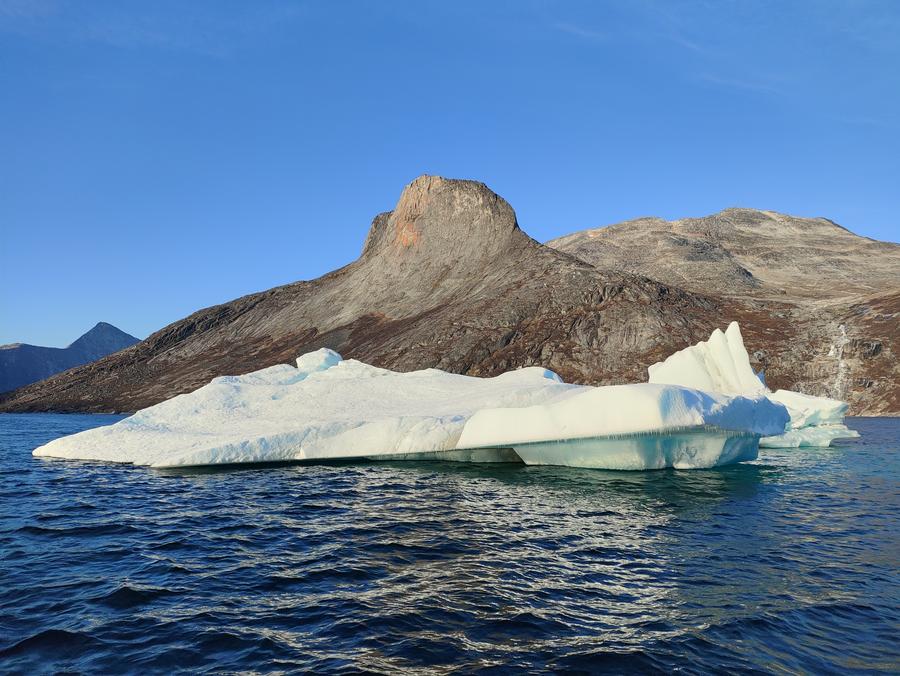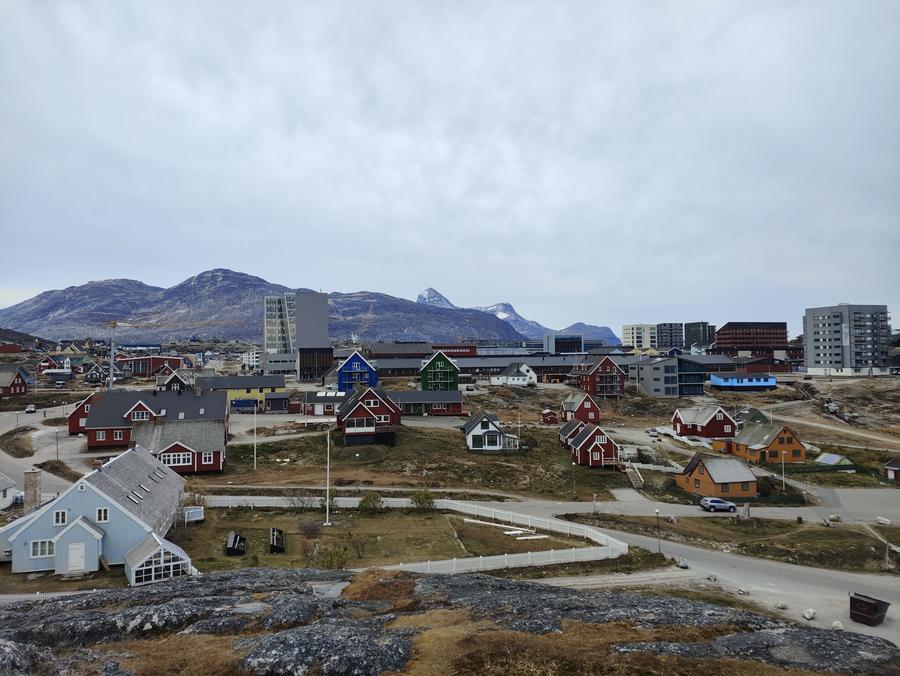Trump's remarks on Greenland spark unease in Europe, signal further U.S.-Europe divisions
COPENHAGEN, Jan. 13 (Xinhua) -- U.S. President-elect Donald Trump's recent remarks on potentially using military force to gain control of Greenland have rung alarm bells across Europe, highlighting major differences between the United States and its European allies.
This controversy, which centers on Greenland's sovereignty, has drawn widespread opposition from European leaders and fueled concerns about Trump's motivations, as well as the future of transatlantic relations.

This photo taken on Oct. 19, 2024 shows the floating ice near Nuuk, capital of Greenland, a self-governing Danish territory. (Photo by Luo Yizhou/Xinhua)
WIDESPREAD OPPOSITION
During a recent press conference at his Mar-a-Lago estate, Trump said he would not rule out using military or economic action to acquire Greenland, an autonomous territory of Denmark. He also said he would consider imposing tariffs on Denmark "at a very high level" if it resisted his offer to acquire the territory.
In response, Danish Prime Minister Mette Frederiksen firmly rejected Trump's statements, emphasizing Greenland's sovereignty. "Greenland's future must be decided in Nuuk," she said, referring to the territory's capital.
Greenland's Prime Minister Mute Egede echoed her stance, stressing that "Greenland belongs to Greenlanders" and rejecting external influence on the region.
Greenland's major political parties, including the ruling Inuit Ataqatigiit and Siumut parties, also rejected Trump's bid.
"We do not want to be part of the United States," said Mariane Paviasen, spokesperson for the Inuit Ataqatigiit party.
Erik Jensen, chairman of the Siumut party, emphasized Greenland's desire for self-governance, while leader of the opposition Naleraq party Pele Broberg noted that "Greenland is not a commodity to be traded."
The controversy has also stirred tensions in Europe. When discussing Trump's remarks with other European Union leaders, German Chancellor Olaf Scholz reiterated that the inviolability of borders is "fundamental international law".
Noting that Greenland is a "territory of the European Union and of Europe," French Foreign Minister Jean-Noel Barrot warned against Trump's statements. Norwegian Prime Minister Jonas Gahr Store called Trump's remarks "unacceptable" and warned of the threat to NATO unity and European stability.
Trump's ambition to "conquer" Greenland is an unprecedented move among Western allies, said Robert Frank, a Croatian political analyst, adding that Trump's policy of prioritizing America's interests while disregarding the EU's sentiments is likely to alter U.S.-EU relations after he assumes office.
"In the future, the division between America and the EU could grow even larger, posing an even greater threat to the survival of the European family," he noted.

This photo taken on Oct. 19, 2024 shows the scenery of Nuuk, capital of Greenland, a self-governing Danish territory. (Photo by Luo Yizhou/Xinhua)
WIDENED DIVISIONS
The tension over Greenland, an island boasting rich resources and bearing growing strategic significance, is seen as part of a broader pattern of U.S. unilateralism under Trump's "America First" policy, which clashes with European values of multilateral cooperation and respect for sovereignty.
The controversial remarks have intensified concerns about the future of U.S.-Europe relations, with experts warning that the divisions could deepen further after his inauguration.
Washington's relationship with Europe, especially with the EU, will change significantly, said Frank.
"In the future, the division between America and the EU could be even bigger and even more dangerous for the survival of the European family," he said.
Experts believe Trump's statements have left an indelible impact on European perceptions of U.S. reliability as an ally.
Francois Heisbourg, special advisor at the International Institute for Strategic Studies, said that Trump's return to power could lead to Europe drifting away from American influence.
"A world without America is a world where there are no more alliance systems as there have been since the end of the Second World War," Heisbourg said, warning that Europe must prepare for "less America" on the global stage.
As the United States moves forward under a new Trump administration, European leaders face the growing challenge of balancing cooperation with strategic independence, especially in geopolitically sensitive regions like the Arctic.
Danish political scientist Kristian Soby Kristensen emphasized the challenges of defending Greenland, given Denmark's limited military resources and reliance on U.S. support. The asymmetry underscores Europe's vulnerability in the face of Trump's transactional diplomacy.
"Denmark has been very aware it cannot defend Greenland against anybody on its own," Kristensen said, adding that Denmark's armed forces, which "have been focused on more routine peacetime military activities," are neither equipped nor trained to resist a U.S. invasion.
Photos
 Shopping for Spring Festival goods brings festive cheer to E China's Jiangsu
Shopping for Spring Festival goods brings festive cheer to E China's Jiangsu Snow scenery of Shanwangping Karst national ecological park in Chongqing
Snow scenery of Shanwangping Karst national ecological park in Chongqing Anxi in SE China's Fujian develops rattan iron crafts into industrial chain worth over 10 bln yuan
Anxi in SE China's Fujian develops rattan iron crafts into industrial chain worth over 10 bln yuan Scenery of snow-covered tea plantations in Zunyi, China's Guizhou
Scenery of snow-covered tea plantations in Zunyi, China's Guizhou
Related Stories
- Japan PM asks Biden to address "strong concerns" in business community over blocking steel takeover deal: media
- Putin-Trump talks possible without any preconditions: Kremlin
- Number of active U.S. drilling down this week
- U.S. stocks dive as robust jobs report dampens easing outlook
- Could this be the US' costliest wildfire? Experts warn of $150 billion disaster
Copyright © 2025 People's Daily Online. All Rights Reserved.





